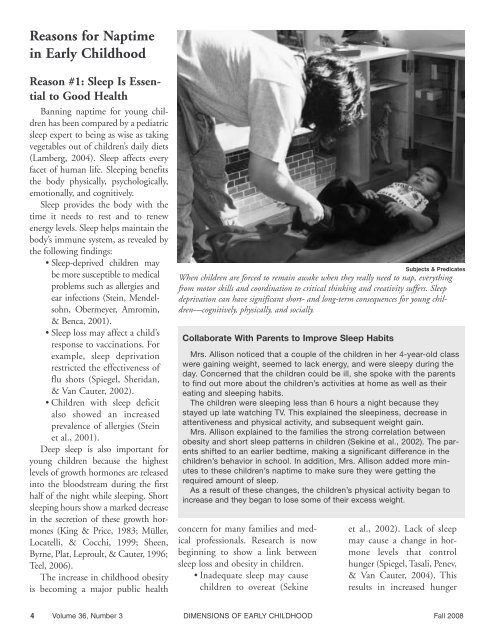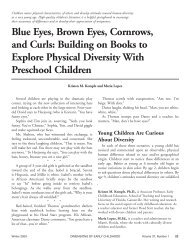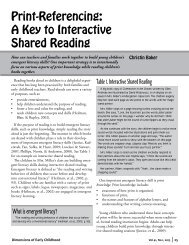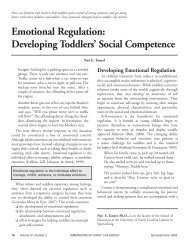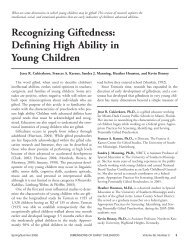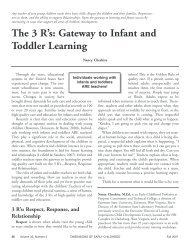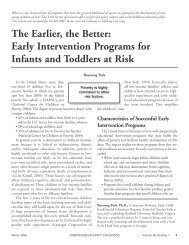Five Essential Reasons to Keep Naptime in the - Southern Early ...
Five Essential Reasons to Keep Naptime in the - Southern Early ...
Five Essential Reasons to Keep Naptime in the - Southern Early ...
You also want an ePaper? Increase the reach of your titles
YUMPU automatically turns print PDFs into web optimized ePapers that Google loves.
<strong>Reasons</strong> for <strong>Naptime</strong><br />
<strong>in</strong> <strong>Early</strong> Childhood<br />
Reason #1: Sleep Is <strong>Essential</strong><br />
<strong>to</strong> Good Health<br />
Bann<strong>in</strong>g naptime for young children<br />
has been compared by a pediatric<br />
sleep expert <strong>to</strong> be<strong>in</strong>g as wise as tak<strong>in</strong>g<br />
vegetables out of children’s daily diets<br />
(Lamberg, 2004). Sleep affects every<br />
facet of human life. Sleep<strong>in</strong>g benefits<br />
<strong>the</strong> body physically, psychologically,<br />
emotionally, and cognitively.<br />
Sleep provides <strong>the</strong> body with <strong>the</strong><br />
time it needs <strong>to</strong> rest and <strong>to</strong> renew<br />
energy levels. Sleep helps ma<strong>in</strong>ta<strong>in</strong> <strong>the</strong><br />
body’s immune system, as revealed by<br />
<strong>the</strong> follow<strong>in</strong>g f<strong>in</strong>d<strong>in</strong>gs:<br />
• Sleep-deprived children may<br />
be more susceptible <strong>to</strong> medical<br />
problems such as allergies and<br />
ear <strong>in</strong>fections (Ste<strong>in</strong>, Mendelsohn,<br />
Obermeyer, Amrom<strong>in</strong>,<br />
& Benca, 2001).<br />
• Sleep loss may affect a child’s<br />
response <strong>to</strong> vacc<strong>in</strong>ations. For<br />
example, sleep deprivation<br />
restricted <strong>the</strong> effectiveness of<br />
flu shots (Spiegel, Sheridan,<br />
& Van Cauter, 2002).<br />
• Children with sleep deficit<br />
also showed an <strong>in</strong>creased<br />
prevalence of allergies (Ste<strong>in</strong><br />
et al., 2001).<br />
Deep sleep is also important for<br />
young children because <strong>the</strong> highest<br />
levels of growth hormones are released<br />
<strong>in</strong><strong>to</strong> <strong>the</strong> bloodstream dur<strong>in</strong>g <strong>the</strong> first<br />
half of <strong>the</strong> night while sleep<strong>in</strong>g. Short<br />
sleep<strong>in</strong>g hours show a marked decrease<br />
<strong>in</strong> <strong>the</strong> secretion of <strong>the</strong>se growth hormones<br />
(K<strong>in</strong>g & Price, 1983; Müller,<br />
Locatelli, & Cocchi, 1999; Sheen,<br />
Byrne, Plat, Leproult, & Cauter, 1996;<br />
Teel, 2006).<br />
The <strong>in</strong>crease <strong>in</strong> childhood obesity<br />
is becom<strong>in</strong>g a major public health<br />
Subjects & Predicates<br />
When children are forced <strong>to</strong> rema<strong>in</strong> awake when <strong>the</strong>y really need <strong>to</strong> nap, everyth<strong>in</strong>g<br />
from mo<strong>to</strong>r skills and coord<strong>in</strong>ation <strong>to</strong> critical th<strong>in</strong>k<strong>in</strong>g and creativity suffers. Sleep<br />
deprivation can have significant short- and long-term consequences for young children—cognitively,<br />
physically, and socially.<br />
Collaborate With Parents <strong>to</strong> Improve Sleep Habits<br />
Mrs. Allison noticed that a couple of <strong>the</strong> children <strong>in</strong> her 4-year-old class<br />
were ga<strong>in</strong><strong>in</strong>g weight, seemed <strong>to</strong> lack energy, and were sleepy dur<strong>in</strong>g <strong>the</strong><br />
day. Concerned that <strong>the</strong> children could be ill, she spoke with <strong>the</strong> parents<br />
<strong>to</strong> f<strong>in</strong>d out more about <strong>the</strong> children’s activities at home as well as <strong>the</strong>ir<br />
eat<strong>in</strong>g and sleep<strong>in</strong>g habits.<br />
The children were sleep<strong>in</strong>g less than 6 hours a night because <strong>the</strong>y<br />
stayed up late watch<strong>in</strong>g TV. This expla<strong>in</strong>ed <strong>the</strong> sleep<strong>in</strong>ess, decrease <strong>in</strong><br />
attentiveness and physical activity, and subsequent weight ga<strong>in</strong>.<br />
Mrs. Allison expla<strong>in</strong>ed <strong>to</strong> <strong>the</strong> families <strong>the</strong> strong correlation between<br />
obesity and short sleep patterns <strong>in</strong> children (Sek<strong>in</strong>e et al., 2002). The parents<br />
shifted <strong>to</strong> an earlier bedtime, mak<strong>in</strong>g a significant difference <strong>in</strong> <strong>the</strong><br />
children’s behavior <strong>in</strong> school. In addition, Mrs. Allison added more m<strong>in</strong>utes<br />
<strong>to</strong> <strong>the</strong>se children’s naptime <strong>to</strong> make sure <strong>the</strong>y were gett<strong>in</strong>g <strong>the</strong><br />
required amount of sleep.<br />
As a result of <strong>the</strong>se changes, <strong>the</strong> children’s physical activity began <strong>to</strong><br />
<strong>in</strong>crease and <strong>the</strong>y began <strong>to</strong> lose some of <strong>the</strong>ir excess weight.<br />
concern for many families and medical<br />
professionals. Research is now<br />
beg<strong>in</strong>n<strong>in</strong>g <strong>to</strong> show a l<strong>in</strong>k between<br />
sleep loss and obesity <strong>in</strong> children.<br />
• Inadequate sleep may cause<br />
children <strong>to</strong> overeat (Sek<strong>in</strong>e<br />
et al., 2002). Lack of sleep<br />
may cause a change <strong>in</strong> hormone<br />
levels that control<br />
hunger (Spiegel, Tasali, Penev,<br />
& Van Cauter, 2004). This<br />
results <strong>in</strong> <strong>in</strong>creased hunger<br />
4 Volume 36, Number 3 DIMENSIONS OF EARLY CHILDHOOD Fall 2008


